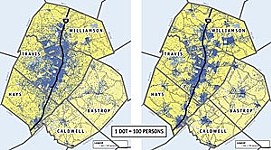Point Austin: Sounds Like a Plan
For the next 25 years, something completely different
By Michael King, Fri., April 16, 2010

(I wouldn't spend too much time considering Map 19: "Structurally Deficient and Functionally Obsolete Bridges" – you might lose your nerve to drive anywhere in the five-county area ....)
It's a wealth of accumulated regional information, useful in its own right and suggestive of the plan's incremental shift from Texas-traditional PCE – Poured Concrete Everywhere – to something approaching transportation nodes and networks. As the document summarizes this latest incarnation of its guiding umbrella over regional transportation planning, "The CAMPO 2035 Plan assumes that the region will work toward implementation of a network of centers oriented around the transportation investments included in the Plan."
It's a mostly admirable collective ambition. Why then, when I asked her about it, did CAMPO transportation policy board member and Travis County Commissioner Sarah Eckhardt describe the 2035 document as an "I want a pony for Christmas" plan? Perhaps because, as the old joke goes, when you come across this big a pile of manure, you can make yourself believe there has to be a pony in there someplace.
Playing the Game
That's my snark, not Eckhardt's, and in fairness, she went on to say that the plan is stronger on aspiration than a specific vision and that the biggest and most persistent problem, especially in the long term, is that nobody in or out of CAMPO knows where the transportation money will come from. For new highways, the state of Texas and the Texas Department of Transportation are effectively bankrupt, with little stomach at the Lege for new taxes – although there is fond and ambivalent hope that somehow the federal government will come to the rescue. As for mass transit money – still more a Travis County dream than that of Williamson, Bastrop, Caldwell, or Hays – let's just say taxing city-dwellers primarily for the direct benefit of suburban commuters is a strategy that has jumped the shark.
One could argue that there are worse things than running out of highway money. That was at least one thread at the 2035 Plan's latest unveiling, a public meeting held Monday night in a cavernous ballroom at the Convention Center. The venue was a well-intentioned change from the usual (UT's Thompson Conference Center) in response to some complaints of overcrowding – not a problem Monday, as barely 75 people turned out and very few had anything to say. Roger Baker and Dick Kallerman of Save Our Springs Alliance and the Sierra Club were in ritual attendance, the former to predict the pending doom of peak oil – he will certainly be right someday – and the latter to suggest, plaintively, that the region would still get along just fine if CAMPO decided to build no more roads at all. There walks the earth no more earnest man alive than Kallerman, so much so that in complaining of CAMPO's short-sightedness, he couldn't keep himself from correcting the grammar of the immortal Casey Stengel, asking, "Doesn't anybody here know how to play this game?" (For the correct version: As Stengel would say, you could look it up.)
The problem was not with the environmentally sustainable sentiments of these or other earnest remarks about bicycles and mass transit, but with the speakers' complete obliviousness to the actual regional politics ranged along the long CAMPO tables. Or to borrow Stengel's metaphor, it's not that the various officials don't know the game – they're each playing by different sets of rules, to different audiences, with different interests, and the notion of a true "regional consensus" is pretty much entirely confined to transportation fantasy baseball.
Skewed Priorities
That was certainly reflected in the simmering controversies that obliquely surfaced Monday night – whether the 2035 Plan should retreat on prior CAMPO commitments to recycle toll road fees within the same travel corridors and whether the plan should even address carbon and greenhouse-gas emissions at all (a question, as you might guess, of which the Williamson County members are extremely dubious). Eckhardt was leading the progressive charge on both issues and managed only to get a subcommittee appointment on the former ("If you can't make progress in the first meeting," declared chair and Travis County Judge Sam Biscoe, "feel free to get up and walk out") and on the latter a bit of technical testimony that yes, indeed, the federal government considers greenhouse gases something transportation plans need to consider.
I'm sure that persuaded the WilCo reps.
In a blistering commentary published two days earlier in the Oak Hill Gazette, Precinct 3 Travis County commissioner (and CAMPO board member) Karen Huber described CAMPO as "grossly dysfunctional," the technical advisory committee (on which the board heavily relies) as systemically unbalanced, and the project financing system as "without uniform standards and without regional priority setting for projects, [so that] local governments that manipulate the system are rewarded with a decided advantage at the funding troughs." Translation: The suburban (especially WilCo) reps want more major highways, and they skew the plan and CAMPO priorities to get those projects financed and built.
Nevertheless, advise our city and county reps, it's the only game in the five-county area, and if you want your few cents out, you damn well better add your two cents in. CAMPO is still inviting public comments on its website, with the expectation that the reviewed and amended 2035 Plan will be finalized some time in June.
The maps are really fascinating.
Got something to say on the subject? Send a letter to the editor.












